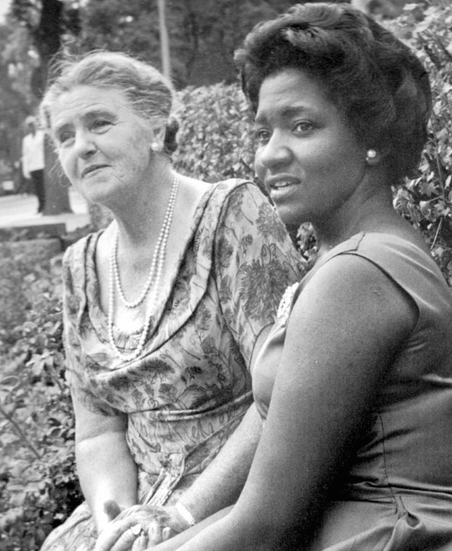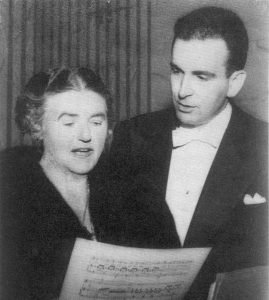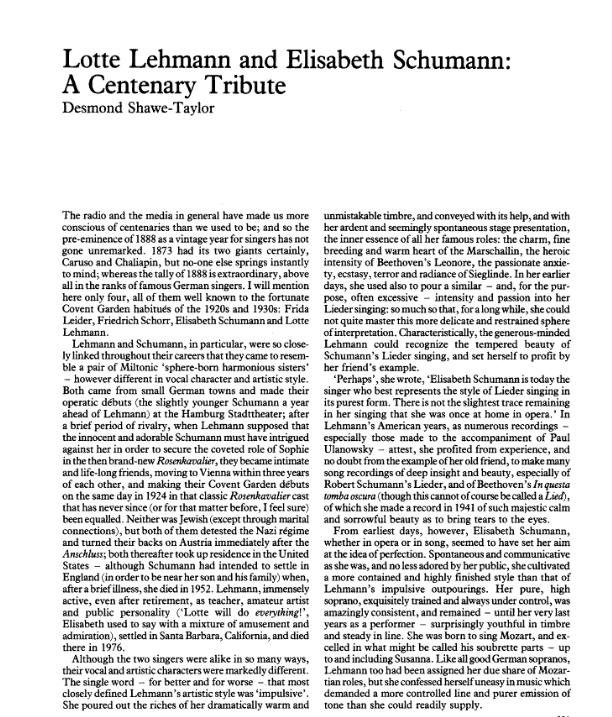Jessye Norman on LL
Here’s what Jessye Norman said about Lehmann:
Jonas Kaufmann on LL
After learning the positive words that Jessye Norman had to say about Lehmann, I was always interested to learn what present day singers think of her. Here’s Kaufmann’s opinion reported by Gonzalo Alonso: After canceling Die schöne Müllerin at the Liceu in 2010, in March 2014 he took the risk of singing Winterreise at the Liceu, also with Helmut Deutsch on piano. It was a packed house. At the dinner afterward, he had me listen to his favorite version of the work on his iPhone: Lotte Lehmann’s.
Nina Stemme on LL
Somebody once asked me, “Would you ever consider Isolde?” “You must be joking,” I said. “I shouldn’t do that. It’s far too long.” I didn’t even know the opera, but I had just heard about it.
Lotte Lehmann wouldn’t touch it.
No. Clever girl. She’s my model Sieglinde: one of the greatest. And those videos when she gives master classes — she’s totally transported. She goes to the piano, and sings one or two octaves down, but it doesn’t matter. We love her.
Pianist, Mitsuko Uchida Remembers LL
Here is Mitsuko Uchida, a well-respected pianist with fond Lehmann memories.
Someone that Brendel and Cooper Listened to
On this 17 June 2025 that we’ve learned of the passing of Alfred Brendel, the following paragraph from his student, Imogen Cooper, seems appropriate:
Soon after my return to London I heard Alfred Brendel playing Schubert and Chopin at the Austrian Institute. It was fascinating. I went up to him afterwards and said, “I must work with you or I’ll die”. He answered, “Why don’t you live and come to Vienna?” The experience changed my life. He gave me time without parameters, we would work for hours on end, then we would sit down and listen to Furtwängler, Fischer, Cortot, the Busch Quartet, Kempff, Lotte Lehmann . . . It was an education, and an enriching experience. He was absolutely uncompromising about how he felt things should be, but also completely convincing, articulate and eloquent. It was a privilege and I learned a huge amount from him: how to listen, how to be aware of what I was doing, the meaning and shape of the phrase and not just the notes. It was a seminally important time for me and formed the basis of my adult music-making.
Grace Bumbry on LL

Grace Bumbry Zoom guest about LL for Wagner Society
Dalton Baldwin on Lotte Lehmann

On 9 April 2018 Dalton Baldwin wrote to me in answer to my questions about how he and Gérard Souzay came to coach with Lotte Lehmann. Here’s his reply: “Gérard Souzay and I had a recital in Santa Barbara and Lotte came backstage afterwards–thus began her infatuation with a handsome French baritone! We stayed at her Hope Ranch Park home several times–Lotte coached him in Lieder. We spent evenings listening to her recordings especially Winterreise. She came to our Carmel [California] recital and introduced us to Noel Sullivan…[1890-1956, an amateur singer, patron of the arts, and philanthropist. Since Sullivan died in 1956 this means that the coaching that Baldwin refers to occurred before that.]
The greatest thrill of all was when she flew over for our recital in Munich–the audience went wild. She painted a kind of comic strip scene where she, as Salome, holds the head of John the Baptist (Souzay) only to be thwarted by an angel (me [Dalton]).”
Jake Heggie on LL
Contemporary opera and art song composer Jake Heggie wrote an extensive review on many recordings for Stereophile magazine….This excerpt refers to the Lehmann portion of the article.
• Brahms: “Die Mainacht” (May Night)—Lotte Lehmann w. orchestra and two with Paul Ulanowsky, piano. Three versions of a great song by one of the most heartfelt German singers of the 20th century. Lehmann, who was Elisabeth Schumann’s contemporary, friend, and once rival, had a one-of-a-kind voice that, despite its flaws—Schumann’s had plenty as well—inspired the likes of Toscanini, Walter, Eric Korngold, and Richard Strauss. “Die Mainacht” finds her at her expressive best, first close to her peak and then as her voice began to age. Lehmann holds nothing back as she expresses the joy, pain, and longing in Brahms’s heart. Once you hear her sing and explore the full range of her artistry, you’ll either dismiss her as “old fashioned” or acknowledge that few singers were/are as naked in their expression, believing in their repertoire, and honest about who they are. Her Brahms, Strauss, Wagner, Korngold, Weber, and more are definitive….
• For “Der Doppelgänger,” Lehmann’s 1941 recording with Ulanowsky, either the live version or even better, the contemporaneous studio recording with Ulanowsky….[are his choice recordings of the Schubert Lied.] [We dedicate a whole page to Lehmann’s Doppelgänger recordings.]
• Robert Schumann: Dichterliebe (A Poet’s Love)—Lehmann and Walter. This beautiful and moving 16-song cycle is such a popular vocal test that in one season, the Bay Area saw performances by four different major baritones. But I learned every note from Lehmann’s famed 1941 recording with Walter at the piano. The pianism is sketchy, but the age and sadness in the voice of a woman—Lehmann—who was forced to leave the Old World only to watch her new house in the hills of Santa Barbara burn to the ground is palpable. As with so much of Lehmann, the performance evokes the words of Richard Strauss: “Her singing moved the stars.”…
Graham Johnson on LL
Thomas Hampson on LL
Mildred Miller on LL

Winterreise
In the January 2025 issue of the BBC Music Magazine there’s a list of recommended recordings of Schubert’s Winterreise. At the point that Christa Ludwig’s recording is mentioned the uncredited author writes: “Though Winterreise is evidently written for a woman (with the text’s references to a bride and suchlike), several women singers have found it irresistible, and the results have often been remarkable: if Birgitte Fassbaender’s recording hadn’t been deleted by EMI, it would have been my unquestioned first choice; and Lotte Lehmann is incomparable, as always.
Biography in Music: Lehmann
Francis Robinson, with many connections to the Metropolitan Opera recorded a Biography in Music to celebrate Lehmann’s 80th birthday and broadcast it on 2/24/1968. Here’s background information on Mr. Robinson:
Francis Robinson began his career in the theater as an usher at the Ryman Auditorium while he was studying at Vanderbilt. He received his B.A. from Vanderbilt in 1932 and his M.A. in 1933. He went on to spend more than thirty years at the Metropolitan Opera where he served variously as tour director, assistant manager, press representative, and host of Saturday afternoon broadcasts from the Met.
Robinson began appearing on the popular “Texaco Opera Quiz” in the 1950s, which aired during radio broadcasts of Met performances, but on February 27, 1960, he came into his own on the Metropolitan Opera broadcast with a musical biography of Enrico Caruso. Using his own extensive collection of Caruso recordings and materials, Robinson put together a twenty-minute program honoring the great tenor. It was a huge success, and that broadcast was the impetus for a series by Robinson called “Biographies in Music” that took place during the third intermission of the Met’s Saturday broadcasts. In introducing Robinson and the series, Milton Cross, host of the Metropolitan Opera broadcast, said that the musical biography of Enrico Caruso was “so moving and brought so many requests for more musical biographies that we have persuaded Mr. Robinson to do a series of such broadcasts for us.” In 1978, Robinson became host for the Live from the Met telecast series, continuing to reach out to opera audiences around the country. He wrote program notes for more than 100 RCA Red Seal albums. The Francis Robinson Collection of Theatre, Music and Dance was given to the Vanderbilt Libraries in 1980.
Celebrating two 1888 birthdays
Lotte Lehmann and Elisabeth Schumann were both born in 1888. Here’s a tribute by the famous music critic Desmond Shawe-Taylor.

LL’s Vocal Registers
Conrad Osborne has a blog called Osborne on Opera: A Critical Blog that in 2017 featured a six part series on “Lotte Lehmann and the Bonding of the Registers” that isn’t as technical as it sounds. It’s an interesting read. Osborne has a series of articles on soprano Lisa Davidson whom he compares with Lotte Lehmann. Another extensive article on Lehmann was inspired by the second set of her recordings by Marston Records.
In Comparison
Philip Tsaras reviewed the new CD of Harriet Burns, who along with her pianist, Ian Tindale, were recent winners of the Contemporary Song Prize in the International Vocal Competition at ‘s-Hertogenbosch. Tsaras offers praise for the “sheer beauty of Burn’s voice” and writes: “Comparisons are invidious, but perhaps inevitable, and it was the same story with most of the other songs I sampled in different performances. I would like more characterisation and personality in Die Männer sind méchant and that is what we get from, for instance, Lotte Lehmann…I sampled a few more versions of one of the most well-known songs here Der Jüngling and der Quelle and it was to find that Elisabeth Schumann, Lotte Lehmann,…are all more communicative with the text and much more specific in their response to it.”
Mention in Fanfare
In the January/February 2024 issue of Fanfare magazine, Raymond Beegle has problems with the baritone Florian Boesch and writes, “…still one is not so deeply convinced, or drawn into the atmosphere of the texts, as one is when hearing Stéphane Degout sing Stille Tränen in his recent Paris recital, or Lotte Lehmann when she sang Alte Laute in New York at her final concert.” Here’s Lehmann’s Alte Laute from her Farewell Recital in Town Hall in 1951.Lehmann sings Alte Laute by Schumann in 1951 with Paul Ulanowsky, piano
Lehmann on Countermelody Podcast
Daniel Gundlach, a member of the board of the (now inactive) Lotte Lehmann Foundation, offers a regular podcast that includes a lot of vocal music. It’s called Countermelody and included the following from June 9, 2023: “Today we observe a significant event in the history of Countermelody, namely, our 200th episode! I decided that there was no better way to celebrate than to devote a full episode to the great Lotte Lehmann (1888-1976).”
Lohengrin Live
David Alden, director of the San Francisco Opera’s recent production of Lohengrin, knew the opera intimately—he collects historic recordings, and has at least thirty historic recordings of Lohengrin. His favorites are the Rudolf Kempe recording, and the Metropolitan Opera live recording featuring Lauritz Melchior and Lotte Lehmann conducted by Artur Bodanzky.
Current Baritone Compared
In the July/August 2023 issue of Fanfare magazine, Raymond Beegle writes the review for a new recording by baritone Konstantin Ingenpass. The opening paragraph reads: “It is a wonderful thing when an artist with a beautiful voice, a secure technique, intelligence and depth of soul, draws the listener’s attention away from all these virtues, and becomes the very wayfarer, or lover, or holy man he sings about. The young baritone Konstantin Ingenpass has the ability to perform such alchemy…Perhaps not since Lotte Lehman (sic) have we heard this power in such abundance as on this recording.”
Die Frau ohne Schatten then and now
“Standing in the shadows of love” is the title of Michael Anthonio’s June 6, 2023 review of a new San Francisco Opera production of Die Frau ohne Schatten which he puts into historical perspective and then writes: “In a way, that event probably served as one of the reasons for the lukewarm reception of the premiere in Vienna, despite the participation of two of the greatest singers of the century, Maria Jeritza and Lotte Lehmann, as the Empress and Dyer’s Wife respectively.”
Marilyn Horne on Lehmann
• Jay Nordlinger recently interviewed Marilyn Horne for the National Review, and the subject of Lehmann was discussed. He writes that “Marilyn attended USC, where she was taught by Lotte Lehmann, among others.” Not true. Lehmann never taught at USC, but while Horne was there she attended Lehmann’s master classes at CalTech. He goes on to write “The budding singer also studied with Lehmann at the Music Academy of the West, in Montecito, just south of Santa Barbara [where Horne lives now]….Wanting to know more about Lehmann, I ask, ‘Did she enjoy teaching?’ Horne reflects on this for a moment. Then she says, ‘You know, my sense of it is that she enjoyed being in front of an audience. And out of it came the teaching.’ Lehmann was a real performer, and why not? In any event, ‘I learned a helluva lot from her,’ says Horne.’ Later in the article Nordlinger writes in reference to Christa Ludwig’s fondness for the songs of Hugo Wolf, “Horne sang a lot of Wolf, too. Lehmann stressed Wolf, and Horne learned from Lehmann.”
A “Lehmann” Voice?
In a 15 May 2022 review of Arabella by Strauss, performed at the Zurich Opera, the critic (rml) wrote: The problem is that “tonal glamour” is a requirement for Arabella, and I was curious of how she would fare in a Lotte Lehmann role. Well, it seems I’ll still have to discover, since she was replaced in the last minute by Jacquelyn Wagner. I am not sure that Ms. Wagner has a Lotte Lehmann voice either –
Intermezzo by Strauss
In a 2 May 2022 review of the Boston Symphony Orchestra in the Boston Musical Intelligencer, Nicolas Sterner writes in connection with the orchestra’s performances of Four Symphonic Interludes from Intermezzo by Richard Strauss. Of the opera, he writes: “The work is semi-autobiographical in nature, written during a turbulent patch with Strauss’s notoriously high-strung soprano wife, Pauline; when fellow Straussian soprano Lotte Lehmann, who premiered the role of Christine, congratulated Pauline on the ‘marvelous present to you from your husband,’ Pauline retorted, characteristically, ‘I don’t give a damn’…”
Lotte Lehmann-Style
Joseph So wrote in a podcast of April 21, 2022: “For music lovers of a certain age, yours truly included, the classical song recital of yore was typically a rather formal affair steeped in the historical tradition. The singer, conservatively attired in evening wear, stands in front of the curved tail of the concert grand, hands clasped, delivering the songs Lotte Lehmann-style, with sincerity and beauty of tone, but with little fanfare other than the appropriate expressiveness.…”
What she said to her students
In the March/April 2022 issue of Fanfare magazine: “…Roderick Williams is a polished singer with a pleasant voice. However, it is overly sweet, overly sentimental, overly ‘sensitive.’ One feels he is trying to convince the listener of his sincerity. ‘I don’t believe you!’ Lotte Lehmann used to say to her students.”
Fanfare Favorite
Fanfare magazine’s Want List 2021 offers their readership the magazine’s critics’ four favorites of the year. Once again, the iBook series Lotte Lehmann & Her Legacy was selected. I write “once again” because the first volume of the now nine volume document, was chosen in 2016. Here are the words of David Cutler, one of Fanfare magazine’s reviewers: “These new iBooks on German soprano Lotte Lehmann, from expert Gary Hickling, are a very attractive proposition indeed. It is hard not to be overwhelmed by the wealth of material here, covering all aspects of Lehmann’s long life and career. The format is fresh, new, and inventive in covering the career of such an historical singer. What is wonderful is being able to click on the various examples of songs, masterclasses, or performances at the press of a finger! You can hear her as you read!”
Janet Baker on Lehmann
In the late 1950s Janet Baker sang in one of Lehmann’s Wigmore Hall master classes. At the beginning of this interview she discusses her unhappiness with the way Lehmann taught.
Mentioned in Fanfare Review
In the November/December 2019 issue of Fanfare magazine Raymond Beegle reviews a new art song CD of baritone Stéphane Degout and makes several complimentary references to Lehmann. “Like Dmitri Hvorostovsky and Lotte Lehmann, this French baritone found in the songs he chose to sing both words and music that were already in his heart, and that he seems ineluctably compelled to express.…” [Beegle refers to the fact that this is a live recording which adds to its intensity. He then writes:] “It brings to mind Lehmann’s last recital [actually there were a handful that followed], and though Degout is far from the end of his career, his artistry is undeniably equal to hers.…[T]he artists seem to say, ‘Here I am, why shouldn’t I tell you the truth?’ and in each case, the audience members, unified by what was given them, falls into rapt silence, as well they should. What they were hearing were performances of a lifetime.…[Toward the end of the article Beegle expresses his negative reaction to the sound engineering of Degout’s performance, writing…] that makes it considerably less satisfactory than the sound of Lehmann’s 1951 recording.”
